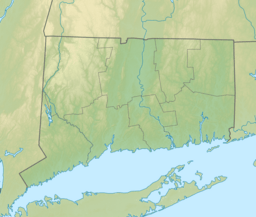Lake Gaillard facts for kids
Quick facts for kids Lake Gaillard |
|
|---|---|
| Location | North Branford, Connecticut |
| Coordinates | 41°21′00″N 72°46′30″W / 41.350°N 72.775°W |
Lake Gaillard is a large man-made lake in North Branford, Connecticut. It was built to store drinking water for many towns in the area. This important reservoir is managed by the South Central Connecticut Regional Water Authority.
Contents
Building Lake Gaillard
Lake Gaillard was planned in the 1920s by the New Haven Water Company. This company is now known as the South Central Connecticut Regional Water Authority. They started buying land in North Branford, near Totoket Mountain, to create a large reservoir.
Construction Begins
Construction on Lake Gaillard began in 1926. It was a very big project that took over seven years to complete. The lake was finally finished in 1933.
Changes to the Area
Building Lake Gaillard changed the landscape of North Branford. The new lake covered 22 homes and farms that were once there. It also affected how people traveled, as it cut off some roads. Many workers who helped build the lake decided to stay and live in the town. This helped the local population grow.
Size and Importance
Lake Gaillard is a very large body of water. It is more than 1.5 miles long and over a mile wide at its biggest points. The reservoir covers a huge part of North Branford. It makes up over 20% of the town's total area.
Providing Drinking Water
This large lake is a vital source of drinking water. It supplies water to more than 500,000 customers. The water from Lake Gaillard goes to many towns in New Haven County, Connecticut. These towns include North Branford, Branford, East Haven, North Haven, and parts of New Haven.
Water Treatment Process
The water from Lake Gaillard is stored for future use. Before it reaches homes, it is sent to a special water treatment plant. Here, the water is cleaned and made safe to drink. After treatment, it is sent out through the public water line system. The land around the lake is private and not open to the public. This helps protect the quality of the drinking water.
 | Bayard Rustin |
 | Jeannette Carter |
 | Jeremiah A. Brown |



